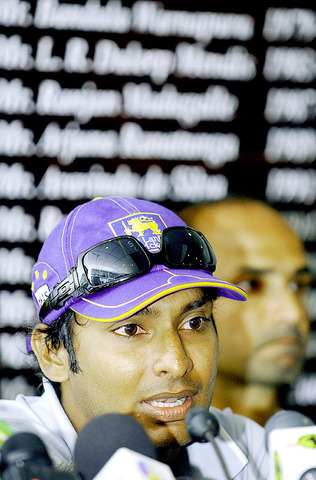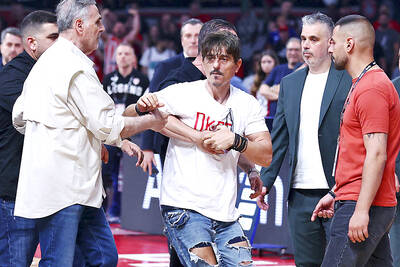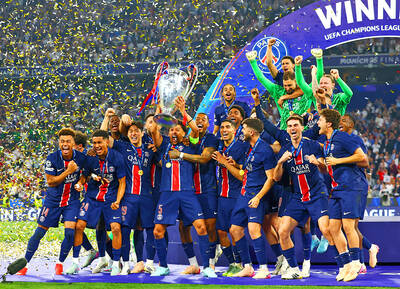Gone are the days when a batsman would plod for 60 overs to make a measly 36 in a one-day match as India's Sunil Gavaskar did in the inaugural World Cup in 1975.
Gone also is a cricket World Cup that would comprise only 15 matches over five playing days with no live global television coverage and little money like that first one in England.
Five days? The upcoming 16-team World Cup in the Caribbean will last 48 days with 51 matches broadcast live to an estimated world-wide audience of 1.5 billion.

The World Cup just keeps getting bigger with more teams, more matches, more money and higher revenue.
Clive Lloyd's West Indians pocketed ?4,000 (US$8,000) for winning the 1975 World Cup and ?10,000 for retaining the title in 1979.
This year's champions after the final in Barbados on April 28 will take home a cool US$2.2 million and the runners-up will be compensated with US$1 million.

PHOTO: AFP
First-timers Bermuda and Ireland are assured of taking home US$15,000 each just for stepping on the pitch. Teams losing each first round match will be rewarded with US$5,000.
The total prize money for this year's World Cup is US$5 million, having grown five-fold since the 1999 edition in England.
Many have questioned the wisdom of bringing in more teams into the World Cup lest it lowers playing standards. Of the 16 going to the West Indies, six are non-Test playing nations.
But television bosses, who usually have the final say in such matters, can't wait for the day when the field is increased to 32 teams like in the football World Cup.
"Cricket needs to evolve," said Nimbus chairman Harish Thawani, who paid a whopping US$612 million to win the marketing rights for Indian cricket for the next four years. "Cricket is essentially a 10-country sport with only 4-5 countries providing revenues worth the mention. But cricket must reduce its excessive dependency on India."
"If the Indian economy slows down, the revenues of the sport will decline. New markets have to be found."
Five of the six global sponsors of the International Cricket Council (ICC) are India-specific because the country's vast cricket-loving population is a sponsors' dream.
The idea of the World Cup was first mooted in England by Ben Brocklehurst, owner of the Cricketer magazine and a former Somerset captain, who suggested a multi-nation tournament be played in 1972.
Brocklehurst wanted the six Test-playing nations then -- England, Australia, India, Pakistan, West Indies and New Zealand -- to join South Africa and a Rest of World team in a 21-match event in September 1972.
The International Cricket Conference, as the ICC was known then, rejected the idea but it was not long before England were asked to host the first World Cup in 1975.
Prudential Assurance sponsored the first three events before the World Cup shifted outside England when political and sporting rivals India and Pakistan hosted the 1987 edition.
The move came with dramatic changes. Matches were reduced from 60 overs to 50-overs-a-side and the 27 World Cup games were spread over 32 days, almost twice as long as in 1983.
Colored clothing and white balls were introduced at the 1992 tournament in Australia and New Zealand where South Africa made a comeback to the world scene from their apartheid-induced ban.
South Africa and the other eight Test nations played each other once in the league phase with the top four advancing to the semi-finals. The number of matches increased from 27 to 39.
Holland, Kenya and the United Arab Emirates made their World Cup debut in 1999, Bangladesh came in 1999 and Namibia and Scotland joined the action in 2003.
The ICC expects to generate revenue worth US$235 million after the Caribbean odyssey.

The Greek basketball league finals between Panathinaikos and Olympiakos were suspended by the government on Monday following on-court scuffles involving rival security teams. The best-of-five series is at 1-1. The third game, scheduled for today, has been postponed. The owners of both clubs were summoned to meet with the country’s sports minister. They “will be asked to provide explicit guarantees that this situation will be brought to an end. If not, this year’s championship will be definitively canceled,” government spokesman Pavlos Marinakis said. “There can be no tolerance for such pathological phenomena of violence and delinquency.” In online posts, the owners of Panathinaikos and

‘DREAM’: The 5-0 victory was PSG’s first Champions League title, and the biggest final win by any team in the 70-year history of the top-flight European competition Paris Saint-Germain won the Champions League for the first time as Luis Enrique’s brilliant young side outclassed Inter on Saturday in the most one-sided final ever with teenager Desire Doue scoring twice in an astonishing 5-0 victory. Doue supplied the pass for Achraf Hakimi to give PSG an early lead and the 19-year-old went from provider to finisher as his deflected shot doubled the advantage in the 20th minute. Doue scored again just after the hour mark, ending any doubt about the outcome before Khvicha Kvaratskhelia ran away to get the fourth and substitute Senny Mayulu, another teenager, made it five. Inter were

Ryan Yarbrough picked up a dazzling World Series ring from his time with the Los Angeles Dodgers last season. Then he went out and beat them. The New York Yankees starter on Sunday pitched one-run ball over six innings, struck out a season-high five and blanked the Dodgers’ top four hitters in a 7-3 win. “I feel like I’m in a really good place right now and really trying to continue that,” Yarbrough said. “I’m having a lot of fun.” The 33-year-old left-hander made 44 relief appearances between the Dodgers and Blue Jays last season. The Dodgers designated him for assignment on July

The Crusaders yesterday produced a clinical performance in difficult conditions to beat the Queensland Reds 32-12 and claim home advantage in next week’s Super Rugby semi-finals. Lock Scott Barrett and prop Tamaiti Williams scored first-half tries to reward an outstanding performance from the Crusaders’ forwards in wet, slippery conditions and bitterly cold temperatures. Scrumhalf Noah Hotham defied the conditions in the second half to score a superb solo try and, after kicking a conversion and penalty to make the score 22-0 at the hour mark, flyhalf Rivez Reihana scored a try which took the game beyond the Reds. “Typical Christchurch weather, cold, wet